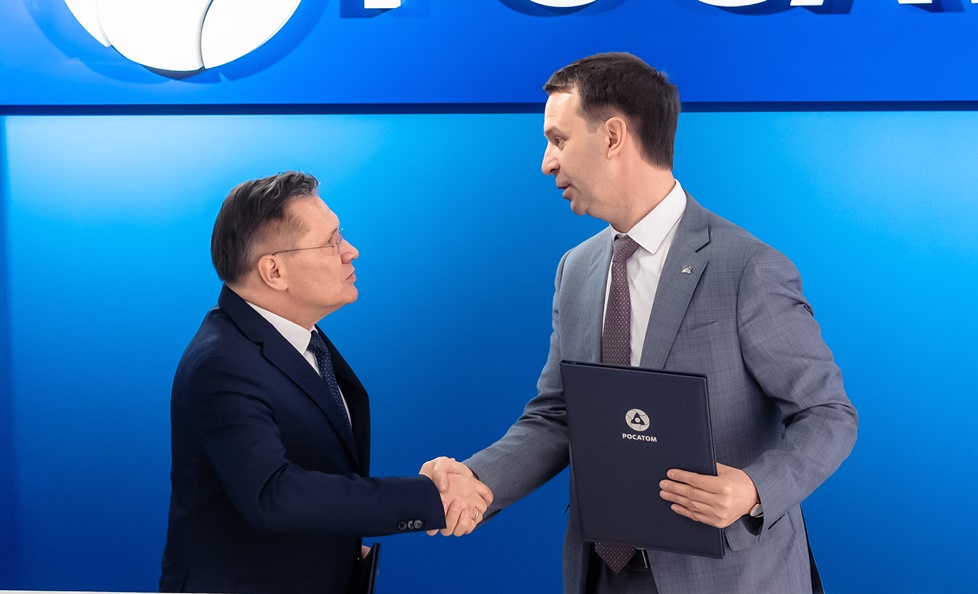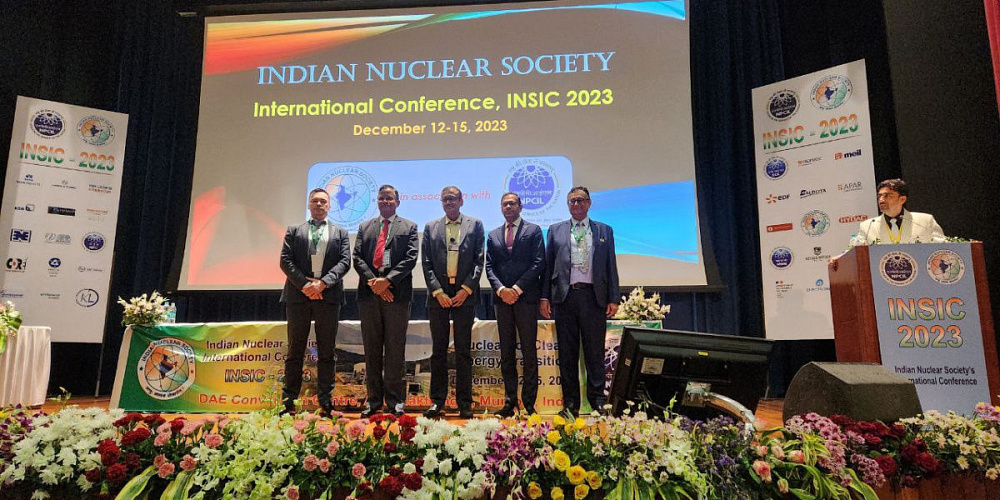On June 26, 2024, on the sidelines of the 2nd ‘Obninsk NEW’ International Youth Nuclear Forum, Alexey Likhachev, Director General of the State Atomic Energy Corporation Rosatom, and Grigory Trubnikov, Director of the Joint Institute for Nuclear Research (JINR), signed an agreement on cooperation in the field of development, creation of promising technologies and modernization of existing ones in the nuclear energy industry, conducting scientific research, as well as creation and operation of modern experimental and test facilities and research infrastructure.
Among the key areas of cooperation in the agreement are fundamental research in the field of super-heavy element synthesis, the study of neutrinos and astrophysics based on Russian nuclear facilities, as well as the Baikal-GVD neutrino telescope, the development and improvement of technologies for the creation and operation of radiation-resistant equipment and systems, the creation and development of promising technologies and equipment for nuclear energy, as well as nuclear medicine and radiation therapy. The parties will also cooperate in the implementation of the international mega-science ‘NICA Complex’ project on the basis of the Joint Institute, ensuring the operation of the JINR research reactor — IBR-2.
As a prelude in the implementation of the commitments stated in the agreement, Grigory Trubnikov signed the Agreement on JINR’s joining the international consortium on the basis of the multipurpose fast neutron research reactor (MBIR). This made JINR an official participant in the consortium and provided the institute with access to the research facilities of the Generation IV reactor being built by Rosatom in Dimitrovgrad (Ulyanovsk Region).
JINR will be able not only to apply its experience in international cooperation, but also to participate in determining the list of experimental research, developing multilateral research programs aimed at using the capabilities of the reactor, as well as contribute to the formation of the scientific and organizational activities of the IRC MBIR consortium.
“We are grateful to JINR for its long-standing partnership and comprehensive support of Rosatom’s projects. The Institute’s joining the MBIR consortium is, first of all, a confirmation of the high scientific status of the project and its technological capabilities. JINR develops broad international scientific and technical cooperation involving 16 states. The Institute is also in contact with more than a thousand research centers and universities in 74 countries around the world. I am confident that, together with JINR, we will be able to significantly expand the research base for the use of MBIR experimental capabilities and strengthen the international research center being created on its basis. This global international platform will not only unite the world scientific community, but will also allow Russia to ensure leadership in the development of innovative reactor technologies,” said Alexey Likhachev, Director General of the Rosatom State Nuclear Energy Corporation.
“The history of the creation of our international scientific organization and its further development, including the creation of research facilities, is inextricably intertwined with the participation of nuclear industry enterprises. We count on Rosatom’s support in updating our basic nuclear facility, the IBR-2M reactor, as well as in forming an infrastructure to study the properties of super-heavy elements, including the synthesis of the 119th and 120th elements, in implementing the NICA accelerator complex project, a project for the development and manufacture of a cyclotron complex based on the MSC-230 superconducting cyclotron for proton radiation therapy and in the creation of a new pulsed neutron source at the Joint Institute. Now Rosatom, for its part, is setting up the unique MBIR research facility as an international open project. The Joint Institute, signing the agreement on joining the MBIR consortium, is ready to share its experience in developing international cooperation in the field of neutron research and is interested in using neutron fluxes of the MBIR reactor for scientific research. At present, scientists of the Institute of Physics and Power Engineering and JINR are discussing possible designs of experimental facilities on the horizontal experimental channels of MBIR. JINR representatives participate in the work of the consortium’s advisory bodies — the IRC MBIR Advisory Board and two committees of the Advisory Board,” said Grigory Trubnikov, Director of the Joint Institute for Nuclear Research, Academician of the Russian Academy of Sciences.
Reference
Rosatom State Nuclear Energy Corporation is constructing a unique research facility — a multipurpose fast neutron research reactor (MBIR) — as part of the comprehensive program ‘Development of Engineering, Technologies and Scientific Research in the Field of the Use of Nuclear Energy in the Russian Federation’. The MBIR International Research Center (ICR) is being formed on the basis of the MBIR Reactor. The scientific group will include Russian and foreign scientists and researchers. The activities of the Center are performed by the Consortium – the International Research Center on the basis of the MBIR reactor.
The new participants are joining the MBIR project by signing the Consortium Agreement. This is the legal documentation of the parties’ relations defining the participants’ rights and obligations for the use of MBIR reactor resources after its commissioning. The Russian and foreign partners get an opportunity to carry out the experiments required for the national programs of peaceful nuclear power development, without the need to directly own the reactor facility (or related obligations on assurance of its safe operation, as well as control and accounting of the nuclear materials. Such an approach provides an opportunity for the flexible use of the reactor resource that satisfies the needs of the scientific community participants. Negotiations are currently taking place with potential partners from the CIS countries and representatives of the Chinese organization CGN.
The Joint Institute for Nuclear Research (Dubna, Moscow Region) is an international intergovernmental scientific organization. It consists of 16 participating countries. JINR’s motto is: “Science bringing nations together”. Fundamental theoretical and experimental research in particle physics, nuclear physics, condensed matter physics, and high-energy physics is carried out here. JINR develops and applies the latest technologies and pays great attention to university education. The Joint Institute has a wide range of experimental facilities. The Institute is implementing a mega-science project — the creation of the superconducting heavy ion collider NICA. JINR plays a leading role in the implementation of the mega-science project to create the Baikal-GVD deep-sea neutrino telescope. JINR scientists discovered 10 new chemical elements of Mendeleev’s Periodic Table.
The Russian industry needs to ensure technological sovereignty and transition to the latest technologies as soon as possible. The government and major domestic companies allocate resources for accelerated development of the domestic research, infrastructure, scientific, and technological facilities. The introduction of innovations and new high-tech equipment allows Rosatom and its enterprises to take new market niches, increase the competitiveness of the nuclear industry and the entire Russian industry as a whole.




